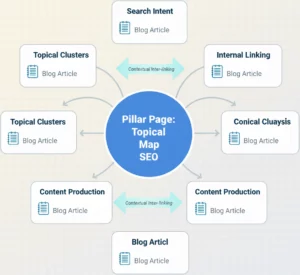
The rise of digital marketing has paved the way for an era where content creation is pivotal. In this context, AI Writers are emerging as revolutionary solutions. But what is their capability to handle complex data with precision? This question is crucial for users eager to optimize their SEO strategy. So, let’s navigate together through the universe of these artificial writers to determine their performance.
Table of Contents
ToggleIntroduction to AI Writers and their role in data analysis
The AI Writer is an advanced form of technology that combines the features of NLP (Natural Language Processing) and machine learning to produce articles and other digital posts. Whether it’s a simple social media post or an exhaustive market study, the AI Redactor transforms how content is generated.

The importance of data accuracy in AI-generated content
In an era where authenticity is a valuable currency, the accuracy of the information distributed can make or break a brand’s credibility. Can you afford to compromise the quality of your digital marketing? The answer is naturally no. This is why deciphering the accuracy of an AI Redactor is a crucial step.
Understanding AI Writers
Definition and main features
An AI Writer is a tool that allows large-scale text production, fueled by various databases and sophisticated algorithms. Managing these elements to create engaging content is at the heart of its capabilities.
The technologies behind AI Redactors : NLP and Machine Learning
NLP allows machines to understand and manipulate human language, while Machine Learning teaches them to learn from their mistakes. Together, these technologies offer a range of text models capable of mimicking human writing.

How do AI Writers process and analyze data?
Through a complex process, AI Writers digest information, determine the content’s purpose, and delve deep into the web to search for the best sources.
Advantages and disadvantages of AI Writers
The benefits of using an AI Writer
Imagine having an unlimited team of redactors capable of instantly generating high-quality texts without ever asking for overtime pay. From time savings to reduced costs, the benefits seem enticing.
>> You may be interested: What is the cost of an AI Writer?
Disadvantages and associated challenges
However, not everything is rosy. The issues of customization, originality, and data security arise.
Data accuracy in AI-generated content
Factors influencing data accuracy
Configuration options, the relevance of text models, and the quality and diversity of sources are all variables that determine the accuracy and quality of content generated by AI Writers.
Examples of accuracy in different types of content
Whether it’s business reports, ad scripts, or social media posts, discrepancies in accuracy are observable.
Evaluating and improving data accuracy
As with any learning process, evaluation is key. Let’s explore together the quality control mechanisms and methods for refining the accuracy of content provided by AI Writers.
Best practices to maximize AI Writer accuracy
Training and adjusting AI Writers
Training an AI Redactor is as delicate as raising a young writer.

How important is purging incorrect data?
Purging incorrect data is of paramount importance in information management. Indeed, erroneous data can lead to serious consequences for a business, whether it’s financial losses, wrong decisions, or damage to the company’s reputation.
By regularly purging incorrect data from their databases, companies ensure the reliability and accuracy of their information. This allows them to make strategic decisions with confidence and optimize their operations.

Moreover, purging incorrect data is also essential for ensuring compliance with current regulations, such as the General Data Protection Regulation (GDPR). Indeed, keeping inaccurate or outdated data can lead to privacy violations and severe penalties from the authorities.
In conclusion, purging incorrect data is a crucial process to ensure the quality and security of information within a company. Therefore, organizations must implement effective data cleansing procedures to preserve their integrity and legitimacy.
Can AI be compared to a sommelier, capable of discerningly selecting the information conducive to creating quality content?
Artificial intelligence can indeed be compared to a sommelier, as it is capable of discerningly selecting and analyzing relevant information for generating quality content. Just as an expert wine sommelier knows how to choose the best bottles based on the preferences and needs of their clients, AI can find and organize the most relevant data to meet users’ expectations.
This ability of AI to process massive amounts of information efficiently and quickly allows it to provide valuable recommendations and insights for creating engaging and relevant content.

Thanks to sophisticated algorithms, AI can analyze market trends, predict consumer behavior, and recommend best practices to optimize content visibility and impact.
Ultimately, AI can play a crucial role in creating quality content by helping editorial teams make informed decisions and optimize their content strategies.
By combining human expertise with the power of AI, companies can leverage these advanced technologies to remain competitive in an ever-evolving market.
Using feedback for continuous improvement
Feedback, the elixir that transforms error into the touchstone of perfection. What role does user feedback play in refining the accuracy of an AI Writer?

Case studies: real-life examples of AI Writers usage
A look at concrete cases where AI shined through its precise analysis capabilities and others where it faltered. What lessons can content creators draw from these situations?
The future of AI Writers and data accuracy
Anticipating technological advancements is a highly speculative sport. But what do current trends indicate about improving AI Writers’ accuracy and their impact on future marketing campaigns?

The accuracy of an AI Writer regarding data is as complex as it is essential in SEO and content marketing. Although promising, these tools require constant refinement to meet users’ growing expectations. The key lies in a harmonious combination of machine learning, relevant feedback, and meticulous source selection. What does the future hold? One thing is certain, the potential for improvement is immense, and consequently, the best may be yet to come.

FAQs
Can AI Writers create original content with accuracy?
Creating original content is certainly within AI Writers’ capabilities but with varying levels of accuracy. Can they surpass Shakespeare? That’s another debate.
How to improve the data accuracy of an AI Writer?
Training is the key. Refining AI engines through a constant feed of quality data and rigorous learning models can lead to increased accuracy.
What are the best practices for evaluating the accuracy of an AI Writer?
Evaluating accuracy involves testing, regular quality checks, and engaging in ongoing conversations with the user community.

Eric Ibanez
Co-fondateur de Hack The SEO
Eric Ibanez a créé Hack The SEO et accompagne des stratégies SEO orientées croissance. Il est aussi co-auteur du livre SEO pour booster sa croissance, publié chez Dunod.
Suggested Articles




